|
|
|
Sort Order |
|
|
|
Items / Page
|
|
|
|
|
|
|
| Srl | Item |
| 1 |
ID:
129527
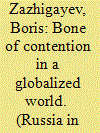

|
|
|
|
|
| Publication |
2014.
|
| Summary/Abstract |
In the context of the twenty-first-century globalized world, Ukraine is destined to play a pivotal role as the junction of civilizations, precisely in the same manner the country did numerous times in the past. Such a role largely determines Ukraine's geopolitical status as a buffer territory, in which conflicts play out between branches of Christianity and European and Asian cultures. In the twenty-first century, controlling Ukrainian territory has become extremely critical. In contrast to past events, this control has acquired a new and far greater geopolitical significance.
|
|
|
|
|
|
|
|
|
|
|
|
|
|
|
|
| 2 |
ID:
128995
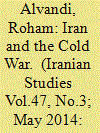

|
|
|
|
|
| Publication |
2014.
|
| Summary/Abstract |
For five decades, fromthe 1940s to the 1980s, Iran lived in the shadow of the Cold War between the United States and the Soviet Union. The country's geography, bordering both the USSR and the oil-rich Persian Gulf, meant that its territory and natural resources were of vital strategic importance in the ideological and material contest between the two superpowers, a global struggle over nothing less than "the soul of mankind."1 With the passage of nearly seventy years since the first Soviet-American confrontation in northern Iran, a growing number of scholars are examining the history of Iran's ColdWar, especially during the reign of Mohammad Reza Shah Pahlavi. Building on the work of earlier diplomatic historians, this emerging historiography looks both inward, at the impact of the Cold War on Iran, and outward, at the role of Iran in the Cold War far beyond its borders.2 This special issue showcases examples of this recent work by historians of Iran's Cold War, some of which was presented at the 2012 biannual conference of the International Society for Iranian Studies in Istanbul. Iran's importance in the Cold War is reflected in the rich literature on Iran's international history during the late Pahlavi period. The 1946 Iranian crisis marked the beginning of Iran's Cold War and the origins of the alliance between the United States and Iran, which continued until the fall of Mohammad Reza Shah in 1979.
|
|
|
|
|
|
|
|
|
|
|
|
|
|
|
|
| 3 |
ID:
132018
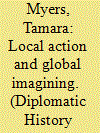

|
|
|
|
|
| Publication |
2014.
|
| Summary/Abstract |
In the late sixties Canadian young people drew attention to global humanitarian crises through the relatively recent innovation of the hunger march. At its peak of popularity, the Miles for Millions walkathon functioned not only as a fundraising tool but as a consciousness-raising vehicle around issues of global significance, including famine, poverty, and war. Children and youth played both symbolic and material roles in the emergence of international development politics and praxis and were fundamental to making the walkathons a spectacular fundraising success. The Walk helped hundreds of thousands of young people imagine themselves belonging to a transnational community in which children mattered. At the same time, imagining global connections between children and youth became intrinsic to Canadian students' sense of nation that insisted on the importance of the country's response to international need. Empathic, emphatic, idealistic, and at times naïve, Canadian youth met the challenge of the Miles for Millions walkathon and were responsible for the millions of foundational dollars raised for the era's international development projects.
|
|
|
|
|
|
|
|
|
|
|
|
|
|
|
|
| 4 |
ID:
132699
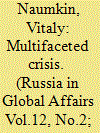

|
|
|
|
|
| Publication |
2014.
|
| Summary/Abstract |
The impact of the Ukrainian crisis on the existing world order proves to be so manifold that it is hard to predict its consequences, irrespective of its outcome. This short article touches upon only a few aspects of the problem.
|
|
|
|
|
|
|
|
|
|
|
|
|
|
|
|
| 5 |
ID:
128540
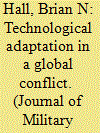

|
|
|
|
|
| Publication |
2014.
|
| Summary/Abstract |
This article seeks to contribute to recent scholarly analysis of the British Army's military performance and its leadership's willingness and ability to adapt during the First World War (1914-1918) by examining a maligned, though vital, aspect of its command and control system, communications. It offers a comparative assessment of the development and contribution of communications to British operations beyond the Western Front and concludes that the army was, on the whole, remarkably successful at adapting its communications system to suit the demands of fighting a modern, global conflict.
|
|
|
|
|
|
|
|
|
|
|
|
|
|
|
|
| 6 |
ID:
132480
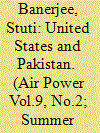

|
|
|
|
|
| Publication |
2014.
|
| Summary/Abstract |
Political instability, economic Volatility, the rise of the right-wing political leadership and an increase in the number of terrorist organisations operating from Pakistan and gaining the support of the Pakistani establishment have nations concerned about the safety of the nuclear assets within Pakistan. Adding to the problem is the well documented proliferation network that has supplied nuclear technology to North Korea, Libya and Iran, with Pakistan, at its centre. These actions have increased the problems and challenges that nuclear proliferation poses. The proliferation of nuclear weapons technology, associated technology and/ or nuclear material to any state or non-state actor, not recognised to receive such technology or material, is one of the most serious dangers to the international security environment. This contributes to not just regional instability and global proliferation, but also increases the risk of violent non-state groups obtaining a nuclear weapon, with a number of violent extremist groups opposed to
India operating from Pakistan. These issues have raised concerns among the international community about the security of Pakistani nuclear weapons. For the United States, Pakistan poses a serious dilemma. Pakistan has been an 'ally' of the United States during the Cold War and continues.
|
|
|
|
|
|
|
|
|
|
|
|
|
|
|
|
|
|
|
|
|